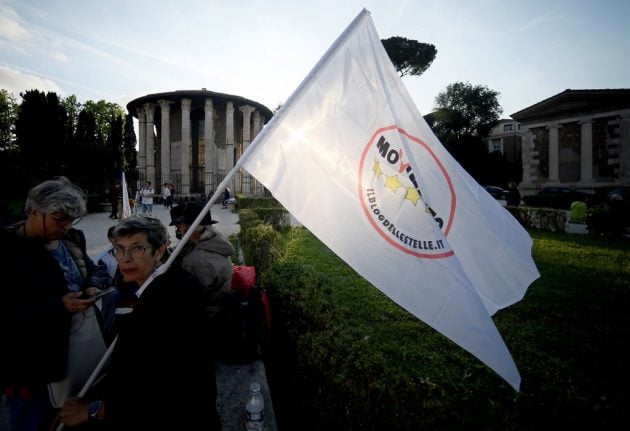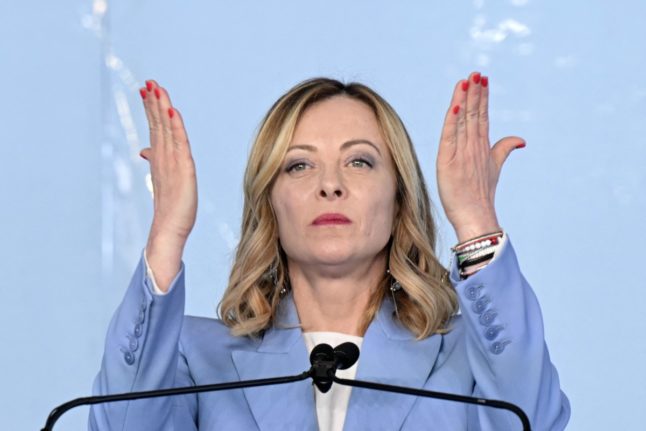Founded by comedian Beppe Grillo and digital marketing specialist Gianroberto Casaleggio, the anti-establishment M5S initially refused any alliances.
But March 2018 elections saw the M5S become the biggest party in Italian politics with 32 percent of the vote, and they eventually formed a coalition with Matteo Salvini's populist, anti-migrant League.
A little over a year later, the M5S is now in talks with the centre-left Democratic Party (PD) to form a new coalition after Salvini tried to bring down the government in a failed power grab.
READ ALSO: How Matteo Salvini lost his gamble to become Italy's PM – for now
The M5S has lost ground to the League over the last 14 months, dropping to 17 percent in May's European parliamentary elections, while the League went from 17 percent last year to 34 percent this year.
“In Italy, given the constitution and the electoral law (which mixes proportional representation with first past the post), the only way to enter into power is to make compromises and that's what M5S has learned,” said Emiliana De Blasio, political science lecturer at Rome's Luiss University.
“Without these compromises, they would have stayed in the corner of the political landscape without ever being able to play a role in the country's public life,” she told AFP.
EXPLAINED:
- An introductory guide to the Italian political system
- Why do Italy's governments collapse so often?
- Political cheat sheet: Understanding Italy's Five Star Movement

The Five Star Movement's current leader, Luigi Di Maio. Photo: Filippo Monteforte/AFP
The M5S is atypical in its organisation and ideology, neither right- nor left-wing, but rather created as an alternative to “establishment” parties, as typified by their latest ally, the PD.
Its transformation from protest movement to governing party played out in successive elections, starting in 2013 when it came in a surprise third place.
At the time, it was the charismatic Grillo and his diatribes against Italy's political “caste” that dominated the M5S. Dignity, hope, transparency were the watchwords on Grillo's extremely popular blog and in his rally speeches.
“This position seduced voters exasperated by a political class characterised by scandals and corruption, who felt abandoned by those in government,” said political analyst Gianfranco Pasquino.
“But once in government the movement was confronted with the reality of power and had to change its political line on a raft of subjects, which disconcerted its own voters,” Pasquino told AFP.
READ ALSO: A new direction for Italy's M5S? Beppe Grillo distances himself from the party he founded

Beppe Grillo continue to attend party rallies but is not longer the Movement's leader. Photo: Alberto Pizzoli/AFP
This change coincided with the naming of Luigi Di Maio as the Movement's political leader. In his 30s, with a relatively slick image compared to the unkempt Grillo, the choice of Di Maio showed a party transformed and ready to move on from its purely protest logic.
Besides forming political alliances, Di Maio's M5S changed course on several policies, notably on remaining in the eurozone. For years M5S had a highly eurosceptic position, which went as far as calling for a consultative referendum on keeping the single currency.
But days before the March 2018 election, the M5S abandoned any mention of leaving the European Union.
READ ALSO: The Five Star digital voting platform that could threaten a government deal in Italy
The Movement is founded on the idea of participatory democracy, and any future coalition deal with their former bitter rival the PD will be put to a vote on M5S's “Rousseau” online platform.
“Returning to the Rousseau system is going back to the M5S roots and a way to reassure long-term activists that the movement has not been perverted by power and that the grassroots still count, even if they don't count that much anymore,” said De Blasio.
“Especially from a democratic point of view, the fact that 100,000 people — the number of those signed up to Rousseau — will vote in the name of the 10 million Italians who voted M5S in 2018, is questionable,” she said.
By AFP's Franck Iovene



 Please whitelist us to continue reading.
Please whitelist us to continue reading.
Member comments